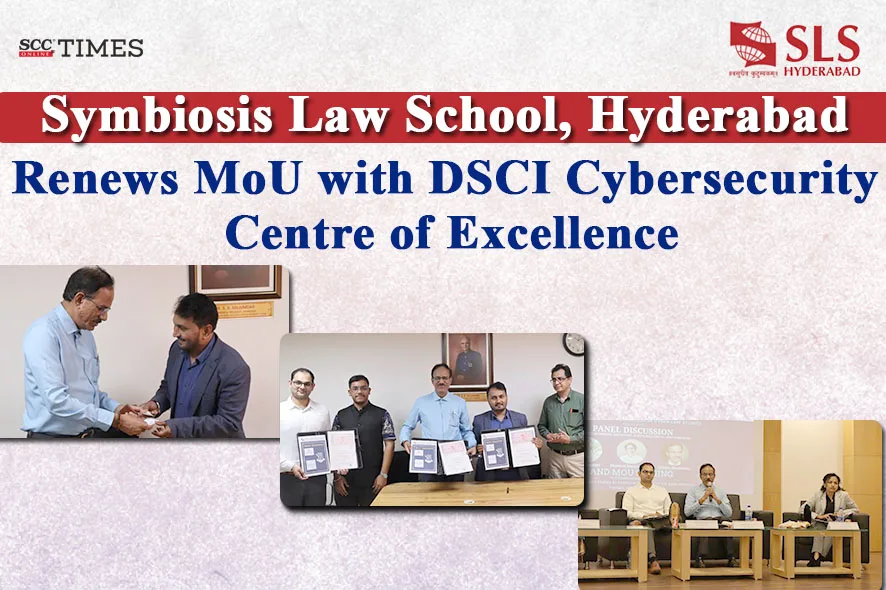Symbiosis Law School, Hyderabad (SLS-H), under the aegis of Symbiosis International (Deemed University), Pune, reaffirmed its commitment to advancing research, collaboration, and capacity-building in the field of data protection and cybersecurity through the renewal of its Memorandum of Understanding (MoU) with the Cybersecurity Centre of Excellence (CCoE) of the Data Security Council of India (DSCI). The MoU was renewed on 9th October 2025 in a ceremony held at the Convention Hall of SLS-H.
The renewed partnership signifies a continued effort by both institutions to strengthen cooperation in academic research, knowledge exchange, and skill enhancement in emerging areas such as data governance, cybersecurity policy, and privacy law. Through this collaboration, SLS-H aims to foster greater industry-academia synergy, provide students with real-time exposure to developments in digital law, and encourage participation in research projects, workshops, and capacity-building programmes organized by DSCI and CCoE.
Following the MoU signing, the Centre for Specialisation in Cyber Law Studies (CSCLS) under the Centre for Intellectual Property and Technology (CIPIT) at SLS-H organized an engaging Panel Discussion on “Data Beyond Borders: Sovereignty, Surveillance and the DPDP Framework.”
The event brought together distinguished experts including Dr. Sriram Birudavolu, CEO, DSCI Cybersecurity Centre of Excellence; Mr. Manank Panchmatia, Associate, PwC India; and Ms. Koka Greeshmi, Associate Data Protection Officer (APAC), Franklin Templeton’s Global Privacy Office. The discussion explored critical issues surrounding data sovereignty, cross-border data flows, surveillance concerns, and the implications of the Digital Personal Data Protection Act (DPDP), 2023.
The panellists offered insightful perspectives on how data now transcends geographical boundaries and how regulatory frameworks like the DPDP Act aim to balance innovation, privacy, and national interests. They also emphasized the importance of organizational compliance, encryption, and protection of individual rights in maintaining digital trust.
Mr. Manank provided a comprehensive analysis of the DPDP Act’s core provisions, tracing India’s privacy evolution from the Pegasus case to the present framework. He elaborated on Section 16(2) concerning minors’ data protection, the need for transparency in data transfers, and the balance between localization and global trade.
Ms. Koka discussed the concept of data sovereignty and compliance mechanisms, stressing that while cross-border data transfers are permissible under the DPDP Act, they must uphold privacy safeguards. She underscored the importance of encryption, compliance, and individual rights protection, while raising pertinent concerns about surveillance and ethical data governance in the age of artificial intelligence.
Dr. Sriram Birudavolu discussed how data today flows freely across borders and is often stored on global server’s unknown to users. He explained that while the DPDP Act allows cross-border data transfer, it restricts such transfers to blacklisted countries that do not meet adequate protection standards.
Through the renewal of this MoU and initiatives like the panel discussion, Symbiosis Law School, Hyderabad continues to demonstrate its dedication to cultivating technologically informed legal professionals equipped to navigate the evolving intersection of law, technology, and policy in the digital era.



